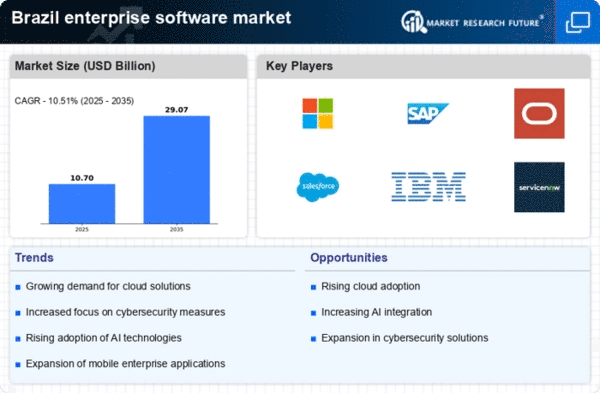Digital Transformation Initiatives
The ongoing digital transformation initiatives across various sectors in Brazil are driving the enterprise software market. Organizations are increasingly adopting software solutions to enhance operational efficiency and improve customer engagement. According to recent data, approximately 70% of Brazilian companies have initiated digital transformation projects, which often necessitate the integration of advanced software systems. This trend indicates a growing demand for enterprise software that can support automation, data management, and customer relationship management. As businesses strive to remain competitive, the enterprise software market is likely to experience substantial growth, fueled by the need for innovative solutions that align with digital strategies.
Regulatory Compliance Requirements
In Brazil, the enterprise software market is significantly influenced by stringent regulatory compliance requirements. Companies are compelled to adopt software solutions that ensure adherence to local laws and regulations, particularly in sectors such as finance, healthcare, and data protection. The implementation of the General Data Protection Law (LGPD) has heightened the need for software that can manage data privacy and security effectively. As organizations invest in compliance-related software, the enterprise software market is expected to expand, with an estimated growth rate of 15% annually as firms prioritize compliance to mitigate legal risks and enhance operational integrity.
Rising Demand for Customizable Solutions
The enterprise software market in Brazil is witnessing a rising demand for customizable solutions tailored to specific industry needs. Businesses are increasingly looking for software that can be adapted to their unique processes and requirements, rather than one-size-fits-all solutions. This trend is particularly evident in sectors such as manufacturing, retail, and logistics, where operational nuances necessitate specialized software functionalities. As a result, software vendors are focusing on providing flexible and scalable solutions, which is likely to drive growth in the enterprise software market. The customization trend may lead to an estimated increase in market size by 12% over the next few years.
Growing Emphasis on Remote Work Solutions
The shift towards remote work in Brazil has created a burgeoning demand for enterprise software that supports collaboration and productivity. Companies are increasingly seeking software solutions that enable seamless communication, project management, and team collaboration, regardless of location. This trend is reflected in the enterprise software market, where tools designed for remote work are experiencing heightened adoption rates. It is estimated that the market for remote work software in Brazil could grow by 20% annually, as organizations recognize the importance of maintaining operational continuity and employee engagement in a flexible work environment.
Increased Investment in IT Infrastructure
The Brazilian government and private sector are making substantial investments in IT infrastructure, which is a key driver for the enterprise software market. Enhanced connectivity and access to high-speed internet are enabling businesses to leverage cloud-based solutions and advanced software applications. Reports indicate that Brazil's IT spending is projected to reach $50 billion by 2026, with a significant portion allocated to enterprise software solutions. This investment trend suggests that as infrastructure improves, the demand for sophisticated software tools will likely rise, facilitating better business processes and innovation across various industries.
















